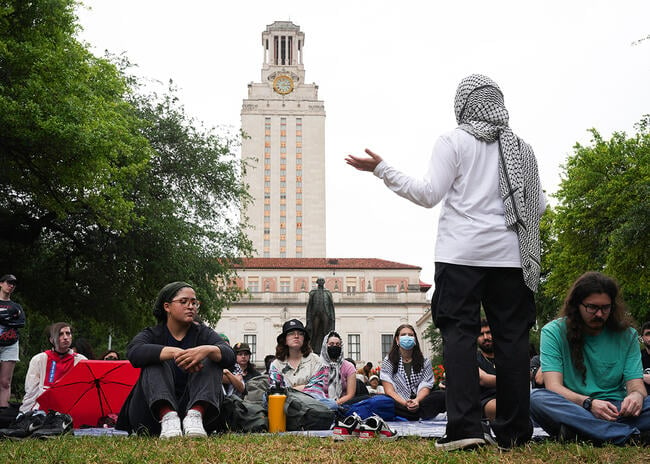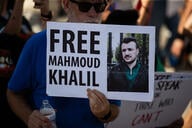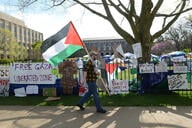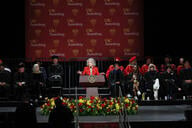You have /5 articles left.
Sign up for a free account or log in.

UT Austin students protested in spring 2024. Now that activity may be restricted by a new law.
Jon Shapley/Houston Chronicle via Getty Images
Texas governor Greg Abbott has signed a controversial bill that would restrict expressive activities on college campuses, reversing some of the rights afforded by a 2019 bill intended to protect Texans’ ability to protest on campuses.
The new legislation, SB 2972, includes a number of limitations on how, when and where individuals can demonstrate on college campuses, striking a key provision in the 2019 bill that established all common outdoor spaces on a public campus as traditional public forums—spaces where anyone can engage in expressive activity. Now, college leaders will decide which areas are public forums.
The bill also changes language from the 2019 legislation that says “all persons” can participate in expressive activities on college campuses to instead cover only “students enrolled at and employees of an institution of higher education,” leaving it up to individual colleges to determine whether the public is welcome to demonstrate there.
The most contested provision of the law prohibits all expressive activities on public campuses from 10 p.m. to 8 a.m. Because the legislation defines expressive activities broadly—as anything allowed under the First Amendment or the analogous section of Texas’s constitution—free speech experts and advocates have warned that the legislation would prohibit essentially all forms of expression between those hours, from wearing a red Make America Great Again hat to engaging in a heated debate in the dining hall. (A similar policy at Indiana University, which banned protests between 11 p.m. and 6 a.m., was blocked last month by a federal judge.)
Tyler Coward, lead counsel of government affairs for the Foundation for Individual Rights and Expression, a free speech watchdog, said in an interview with Inside Higher Ed that the ban on expressive activity after 10 p.m. is “flatly unconstitutional.”
“That would essentially require institutions to prohibit any speech at all between those hours,” he said. FIRE wrote to Abbott to ask that he veto SB 2972.
The bill is authored by Sen. Brandon Creighton, a Republican who also authored the state’s legislation outlawing diversity, equity and inclusion. It comes after a surge of protests roiled college campuses nationwide in response to Hamas’s deadly Oct. 7, 2023, attack on Israeli civilians and Israel’s subsequent war in Gaza. In Texas alone, at least 100 pro-Palestinian protests have taken place on public campuses since then, according to Harvard University’s Nonviolent Action Lab, and demonstrators erected encampments on at least four. Most notably, dozens of students were arrested at an encampment at the University of Texas at Austin after police deployed pepper spray and flash-bang grenades to try to break up the protest.
Steven T. Collis, a law professor at the University of Texas School of Law and the director of the school’s Bech-Loughlin First Amendment Center, said he thinks the main goal of legislation is to prevent outsiders from protesting on college campuses. During last year’s demonstrations, politicians and university administrators alike bemoaned the participation of “outside agitators,” likely inspiring the change.
As to whether it’s legal to prevent the public from demonstrating on a public campus, Collis said it may end up varying by campus, according to how each was used by the public before the 2019 law was passed.
“I could see a judge doing an analysis and looking at it and saying, ‘This place has always been seen by the community as like a public park and you don’t get to say that it’s not,’” he said.
Other provisions in the law outlaw erecting tents on campus, demonstrating during the last two weeks of classes, wearing masks or another “disguise” to hide one’s identity, and lowering the U.S. flag or Texas flag in order to raise another nation or organization’s flag.
Vague Language
Several Texas university students and alumni, including some from UT Austin who were on campus amid the protests in 2024, spoke out against the bill during a hearing in the Senate Committee on Education K–16 in April. A current UT Austin law student, Noor Saleh, testified that she thought the bill’s vagueness could lead to unintended outcomes.
“When we see things lack specific definitions, as we do see in SB 2972, what we can see is things like tailgate tents being no longer allowed on Texas’s campus, which is incredibly disheartening for those of us who liked to go tailgate before our football games,” she said. “This bill, while perhaps well intentioned, opens the door to a troubling level of overregulation.”
Others pointed out that the legislation might restrict peaceful expressive activities that Republican lawmakers would likely be in favor of, such as candlelight vigils in honor of veterans and aborted fetuses.
Carson Bethall, the president of the Texas A&M University chapter of Young Americans for Freedom, a conservative student organization, said in an interview with Inside Higher Ed that he, too, thinks parts of bill go too far. His own organization often holds events that go past 10 p.m., he said, or that take place during finals week. And while he understands the idea of limiting who can protest on campuses, he said that rule, too, may be too broad.
“Christian apologetics come to college campuses, especially in Texas, and dialogue with students in large group forums,” he said. “It’s been somewhat of a disruption—you have to take a different route to class because there are so many people in one area … but if we’re going to read everything equally, that would be prohibited, which, I don’t really think it should be prohibited."
Several opponents of the law have also criticized its reversal on protections afforded by the 2019 bill, SB 18, which was championed by Republican lawmakers who objected to colleges canceling appearances by conservative speakers. Republican lieutenant governor Dan Patrick called the bill a top priority for the Legislature, and it passed the Senate unanimously.
In introducing SB 2972 during an April hearing, Creighton argued that the legislation, in fact, strengthens the 2019 law, “[reaffirming] the expressive rights of students and employees in Texas public institutions of higher education while also setting boundaries intended to prevent unnecessary disruption and to ensure campus safety.”
Texas senator Joan Huffman, who authored SB 18, echoed those sentiments in a written statement to Inside Higher Ed.
“I supported Senate Bill 2972 because it establishes clear and necessary boundaries to prevent disruptions on college campuses while prioritizing community safety,” she wrote. “I believe that Senate Bill 2972 does not undermine the intent or goals of Senate Bill 18 from 2019. Both bills work to ensure that our academic environments remain spaces for open dialogue and learning, fostering an atmosphere where diverse perspectives can thrive while maintaining safety.”
Others disagree that the new legislation upholds the aims of SB 18, reflecting what appears to be part of a larger shift in political attitudes toward free speech in recent years. When right-wing speakers were shouted down and conservative professors criticized for offensive speech on college campuses in the 2010s, Republicans emerged as strong proponents of First Amendment rights, advocating for laws like SB 18 in Texas and promoting the idea that students should be open to hearing ideas they disagree with or find harmful. But since the pro-Palestinian protests began in 2023, Republicans have cracked down on speech they deem antisemitic and on the universities they claim are failing to curb that speech.
“[SB 18] was championed as protecting expression on campus, setting an example for the rest of the country to encourage, not penalize, thoughtful debate, dialogue and expression,” Sameeha Rizvi, who works for the Council on American-Islamic Relations’ Texas chapter, said at the hearing. “SB 2972 directly contradicts the Legislature’s own commitment to campus free speech.”




